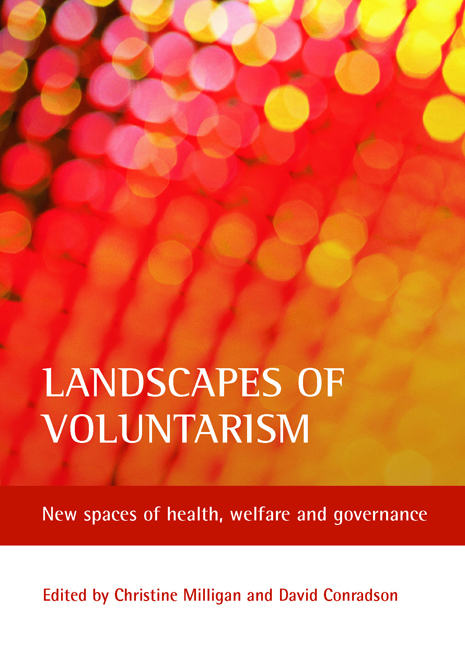Book contents
- Frontmatter
- Contents
- List of tables, figures, maps and plates
- Notes on contributors
- Foreword: Beyond the shadow state?
- one Contemporary landscapes of welfare: the ‘voluntary turn’?
- two A ‘new institutional fix’? The ‘community turn’ and the changing role of the voluntary sector
- three Renewal or relocation? Social welfare, voluntarism and the city
- four Voluntarism and new forms of governance in rural communities
- five New times, new relationships: mental health, primary care and public health in New Zealand
- six Informal and voluntary care in Canada: caught in the Act?
- seven Competition, adaptation and resistance: (re)forming health organisations in New Zealand’s third sector
- eight The difference of voluntarism: the place of voluntary sector care homes for older Jewish people in the United Kingdom
- nine Values, practices and strategic divestment: Christian social service organisations in New Zealand
- ten Faith-based organisations and welfare provision in Northern Ireland and North America: whose agenda?
- eleven Government restructuring and settlement agencies in Vancouver: bringing advocacy back in
- twelve Developing voluntary community spaces and Ethnicity in Sydney, Australia
- thirteen The voluntary spaces of charity shops: workplaces or domestic spaces?
- fourteen The changing landscape of voluntary sector counselling in Scotland
- fifteen Volunteering, geography and welfare: a multilevel investigation of geographical variations in voluntary action
- sixteen Reflections on landscapes of voluntarism
- Index
fifteen - Volunteering, geography and welfare: a multilevel investigation of geographical variations in voluntary action
Published online by Cambridge University Press: 15 January 2022
- Frontmatter
- Contents
- List of tables, figures, maps and plates
- Notes on contributors
- Foreword: Beyond the shadow state?
- one Contemporary landscapes of welfare: the ‘voluntary turn’?
- two A ‘new institutional fix’? The ‘community turn’ and the changing role of the voluntary sector
- three Renewal or relocation? Social welfare, voluntarism and the city
- four Voluntarism and new forms of governance in rural communities
- five New times, new relationships: mental health, primary care and public health in New Zealand
- six Informal and voluntary care in Canada: caught in the Act?
- seven Competition, adaptation and resistance: (re)forming health organisations in New Zealand’s third sector
- eight The difference of voluntarism: the place of voluntary sector care homes for older Jewish people in the United Kingdom
- nine Values, practices and strategic divestment: Christian social service organisations in New Zealand
- ten Faith-based organisations and welfare provision in Northern Ireland and North America: whose agenda?
- eleven Government restructuring and settlement agencies in Vancouver: bringing advocacy back in
- twelve Developing voluntary community spaces and Ethnicity in Sydney, Australia
- thirteen The voluntary spaces of charity shops: workplaces or domestic spaces?
- fourteen The changing landscape of voluntary sector counselling in Scotland
- fifteen Volunteering, geography and welfare: a multilevel investigation of geographical variations in voluntary action
- sixteen Reflections on landscapes of voluntarism
- Index
Summary
Volunteering and voluntarism have recently been characterised as a ‘lost continent’ of social life (Salamon et al, 2000), in that relatively little appears to be known about the patterns and determinants of voluntary activity. Yet voluntary activity has rarely had such salience in political debate. Firstly, from a range of political perspectives, it is argued that political institutions are failing to engage citizens and that the consequence is a retreat into the private sphere of the home and the family and an absorption in individualised consumption. The remaking of citizenship will therefore involve a transition from passive and limited participation in the formal institutions of democracy to active citizenship through participation in civil society (Brown et al, 2000, p 55).
Furthermore, fiscal pressures on welfare systems have led governments to rely to a greater extent on the voluntary sector as a means of obtaining greater flexibility and responsiveness in the welfare state. Regardless of the contrasting interpretations of this development (for example, Johnson, 1987; Wolch, 1989; Whelan, 1996) the implication is a greater reliance on volunteers and unpaid carers to buttress the core services of the welfare state. A specific example would be the ‘new’ Labour government in the UK, a distinctive characteristic of which has been its determination to distance itself from ‘old’ Labour by constantly reminding citizens that there are limits to what government can do and that the corollary is a much greater degree of partnership, entailing an expansion of voluntary support for welfare provision, or of voluntary involvement in governance.
The extent to which such programmes and policies will succeed depends on the response by people in local communities to such calls for voluntary effort. There are strong grounds for the view that the extent of voluntary activity is a function of context (the characteristics of a place) as well as composition (the type of people who are resident in a place). There is much work on geographies of voluntarism using aggregate statistical sources (see Chapter One, this volume), which has broadly lent support to the view that the safety net represented by the voluntary sector had a ‘mesh of varying size’, so that the probability of slipping through it varied, depending on location (for example, Wolch and Geiger, 1983; Wolch, 1989; Wolpert, 1990). Other national and international comparisons confirm these differences in capacity (Salamon, 1995; Kendall and Knapp, 1996).
- Type
- Chapter
- Information
- Landscapes of VoluntarismNew Spaces of Health, Welfare and Governance, pp. 267 - 284Publisher: Bristol University PressPrint publication year: 2006



